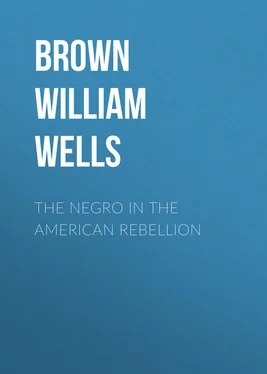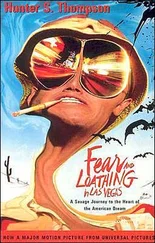William Brown - The Negro in The American Rebellion
Здесь есть возможность читать онлайн «William Brown - The Negro in The American Rebellion» — ознакомительный отрывок электронной книги совершенно бесплатно, а после прочтения отрывка купить полную версию. В некоторых случаях можно слушать аудио, скачать через торрент в формате fb2 и присутствует краткое содержание. Жанр: foreign_antique, foreign_prose, на английском языке. Описание произведения, (предисловие) а так же отзывы посетителей доступны на портале библиотеки ЛибКат.
- Название:The Negro in The American Rebellion
- Автор:
- Жанр:
- Год:неизвестен
- ISBN:нет данных
- Рейтинг книги:4 / 5. Голосов: 1
-
Избранное:Добавить в избранное
- Отзывы:
-
Ваша оценка:
- 80
- 1
- 2
- 3
- 4
- 5
The Negro in The American Rebellion: краткое содержание, описание и аннотация
Предлагаем к чтению аннотацию, описание, краткое содержание или предисловие (зависит от того, что написал сам автор книги «The Negro in The American Rebellion»). Если вы не нашли необходимую информацию о книге — напишите в комментариях, мы постараемся отыскать её.
The Negro in The American Rebellion — читать онлайн ознакомительный отрывок
Ниже представлен текст книги, разбитый по страницам. Система сохранения места последней прочитанной страницы, позволяет с удобством читать онлайн бесплатно книгу «The Negro in The American Rebellion», без необходимости каждый раз заново искать на чём Вы остановились. Поставьте закладку, и сможете в любой момент перейти на страницу, на которой закончили чтение.
Интервал:
Закладка:
“’ By order of
“‘THOS. O. MOORE, Governor .
“‘31. GRIVOT, Adjutant-General .’
“And whereas said military organization, by the same order, was directed to report to Major-Gen. Lewis for service, but did not leave the city of New Orleans when he did:
“Now, therefore, the commanding-general, believing that a large portion of this military force of the State of Louisiana are willing to take service in the volunteer forces of the United States, and be enrolled and organized to ‘defend their homes from ruthless invaders;’ to protect their wives and children and kindred from wrongs and outrages; to shield their property from being seized by bad men; and to defend the flag of their native country as their fathers did under Jackson at Chalmette against Packingham and his myrmidons, carrying the black flag of ‘beauty and booty’.
“Appreciating their motives, relying upon their ‘well-known loyalty and patriotism,’ and with ‘praise and respect’ for these brave men, it is ordered that all the members of the ‘Native Guards’ aforesaid, and all other free colored citizens recognized by the first and late governor and authorities of the State of Louisiana as a portion of the militia of the State, who shall enlist in the volunteer service of the United States, shall be duly organized by the appointment of proper officers, and accepted, paid, equipped, armed, and rationed as are other volunteer corps of the United States, subject to the approval of the President of the United States. All such persons are required to report themselves at the Touro Charity Building, Front Levee Street, New Orleans, where proper officers will muster them into the service of the United States.
“By command of
“R. S. DAVIS, Captain and A.A.A.G.
“ Major-Gen. BUTLER .”
The commanding general soon discovered that he was amongst a different people from those with whom he had been accustomed to associate. New Orleans, however, though captured was not subdued. The city had been for years the headquarters and focus of all Southern rowdyism. An immense crowd of “loafers,” many without regular occupation or means, infested the streets, controlled the ballot-boxes, nominated the judges, selected the police, and affected to rule every one except a few immensely wealthy planters, who governed them by money. These rowdies had gradually dissolved society, till New Orleans had become the most blood-thirsty city in the world; a city where every man went armed, where a sharp word was invariably answered by a stab, and where the average of murdered men taken to one hospital was three a day. The mob were bitter advocates of slavery, held all Yankees in abhorrence, and guided by the astute brain of Pierre Soulé, whilom ambassador to Spain, resolved to contest with Gen. Butler the right to control the city. They might as well have contested it with Bonaparte. The first order issued by the general indicated a policy from which he never swerved. The mob had surrounded the St. Charles Hotel, threatening an attack on the building, then the general’s headquarters; and Gen. Williams, commanding the troops round it, reported that he would be unable to control the mob. “Gen. Butler, in his serenest manner, replied, ‘Give my compliments to Gen. Williams, and tell him, if he finds he cannot control the mob, to open upon them with artillery.’” The mob did that day endeavor to seize Judge Summers, the Recorder; and he was only saved by the determined courage of Lieut. Kinsman, in command of an armed party. From this moment the general assumed the attitude he never abandoned, that of master of New Orleans, making his own will the law. He at first retained the municipal organization; but, finding the officials incurably hostile, he sent them to Fort Lafayette, and thenceforward ruled alone, feeding the people, re-establishing trade, maintaining public order, and seeing that negroes obtained some reasonable measure of security. Their evidence was admitted, “Louisiana having, when she went out of the Union, taken her black code with her;” the whipping-house was abolished, and all forms of torture sternly prohibited.
The following interesting narrative, given by a correspondent of “The Atlantic Monthly,” will show, to some extent, the scenes which Gen. Butler had to pass through in connection with slavery: —
“One Sunday morning, late last summer, as I came down to the breakfast-room, I was surprised to find a large number of persons assembled in the library.
“When I reached the door, a member of the staff took me by the arm, and drew me into a room toward a young and delicate mulatto girl, who was standing against the opposite wall, with the meek, patient bearing of her race, so expressive of the system of repression to which they have been so long subjected.
“Drawing down the border of her dress, my conductor showed me a sight more revolting than I trust ever again to behold.
“The poor girl’s back was flayed until the quivering flesh resembled a fresh beefsteak scorched on a gridiron. With a cold chill creeping through my veins, I turned away from the sickening spectacle, and, for an explanation of the affair, scanned the various persons about the room.
“In the centre of the group, at his writing-table, sat the general. His head rested on his hand, and he was evidently endeavoring to fix his attention upon the remarks of a tall, swarthy-looking man who stood opposite, and who, I soon discovered, was the owner of the girl, and was attempting a defence of the foul outrage he had committed upon the unresisting and helpless person of his unfortunate victim, who stood smarting, but silent, under the dreadful pain inflicted by the brutal lash.
“By the side of the slave-holder stood our adjutant-general, his face livid with almost irrepressible rage, and his fists tight clenched, as if to violently restrain himself from visiting the guilty wretch with summary and retributive justice. Disposed about the room, in various attitudes, but all exhibiting in their countenances the same mingling of horror and indignation, were other members of the staff; while near the door stood three or four house-servants, who were witnesses in the case.
“To the charge of having administered the inhuman castigation, Landry (the owner of the girl) pleaded guilty, but urged, in extenuation, that the girl had dared to make an effort for that freedom which her instincts, drawn from the veins of her abuser, had taught her was the God-given right of all who possess the germ of immortality, no matter what the color of the casket in which it is hidden.
“I say ‘drawn from the veins of her abuser,’ because she declared she was his daughter; and everyone in the room, looking upon the man and woman confronting each other, confessed that the resemblance justified the assertion.
“At the conclusion of all the evidence in the case, the general continued in the same position as before, and remained for some time apparently lost in abstraction. I shall never forget the singular expression on his face.
“I had been accustomed to see him in a storm of passion at any instance of oppression or flagrant injustice; but, on this occasion, he was too deeply affected to obtain relief in the usual way.
“His whole air was one of dejection, almost listlessness; his indignation too intense, and his anger too stern, to find expression, even in his countenance. After sitting in the mood which I have described at such length, the general again turned to the prisoner, and said, in a quiet, subdued tone of voice, —
“‘Mr. Landry, I dare not trust myself to decide to-day what punishment would be meet for your offence; for I am in that state of mind that I fear I might exceed the strict demands of justice. I shall therefore place you under guard for the present, until I conclude upon your sentence.’
Читать дальшеИнтервал:
Закладка:
Похожие книги на «The Negro in The American Rebellion»
Представляем Вашему вниманию похожие книги на «The Negro in The American Rebellion» списком для выбора. Мы отобрали схожую по названию и смыслу литературу в надежде предоставить читателям больше вариантов отыскать новые, интересные, ещё непрочитанные произведения.
Обсуждение, отзывы о книге «The Negro in The American Rebellion» и просто собственные мнения читателей. Оставьте ваши комментарии, напишите, что Вы думаете о произведении, его смысле или главных героях. Укажите что конкретно понравилось, а что нет, и почему Вы так считаете.











